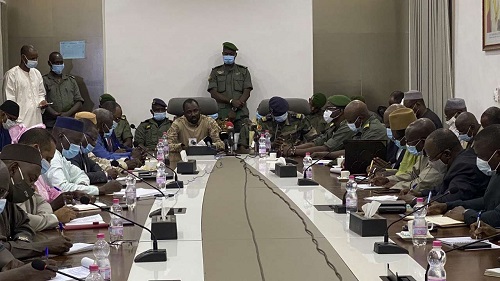Mali’s military regime on Monday strongly condemned West African sanctions including border closures and a trade embargo over delays to a return to civilian rule, saying regional leaders were allowing themselves to be “exploited” by foreign powers.
The junta also announced the recall of its ambassadors and the closure of its borders in a tit-for-tat move.
The leaders of the Economic Community of West African States (ECOWAS) meeting on Sunday agreed to cut financial aid and freeze Mali’s assets at the Central Bank of West African States, according to a final declaration.
A proposal by Mali’s military rulers to hold elections in December 2026 “simply means that an illegitimate military transition government will take the Malian people hostage during the next five years”, said ECOWAS.
Responding with a statement read on national television Monday, the junta’s spokesman Colonel Abdoulaye Maiga said it “strongly condemned these illegal and illegitimate sanctions”.
The junta said the measures would “affect populations already severely affected by the security crisis and the health crisis” but added that it had made arrangements to ensure normal supplies “by all appropriate means”.
Rising tensions
The meeting followed months of increasing tensions over the timetable for restoring civilian rule in Mali after two coups and a military takeover.
The new sanctions are even tougher than those imposed after the first putsch in August 2020, which are believed to have forced the junta at the time to agree to returning power to civilians within 18 months of elections.
The current military regime says it is not able to organise elections as planned at the end of February, citing the security situation in the country.
Since first coup in which army officers led by Colonel Assimi Goita toppled the elected president Ibrahim Boubacar Keita, ECOWAS has pushed for a return to civilian rule as soon as possible.
Under threat of sanctions, Goita promised to restore civilian rule in February 2022 after holding presidential and legislative elections.
But he staged a second coup in May 2021, forcing out an interim civilian government, disrupting the reform timetable, and provoking widespread diplomatic condemnation.
ECOWAS insisted that Mali hold elections in February.
But the junta then said it would set an election date only after holding a nationwide conference, arguing a peaceful vote was more important than speed.
‘It’s a joke’
The junta sent two ministers to Accra on Saturday to submit a new proposed timetable.
The move was intended “to maintain dialogue and good cooperation with ECOWAS”, said Malian Foreign Minister Abdoulaye Diop, without elaborating.
“Mali’s counter-proposal is for a four-year transition,” said a senior official from Ghana, which holds the ECOWAS chair. “It’s a joke.”
The 15-nation bloc has led the push for the former French colony to honour its commitment to stage elections early this year.
The bloc’s push to ensure a return to civilian rule has put its credibility on the line as it seeks to uphold fundamental principles of governance and contain regional instability.
At a summit on December 12, ECOWAS leaders reiterated demands that the elections be held by February 27 as initially planned.
They maintained sanctions such as asset freezes and travel bans within the ECOWAS region against around 150 junta figures and their families, and threatened further “economic and financial” measures.
ECOWAS did not impose sanctions immediately after Mali’s second putsch in May 2021, but in November opted for targeted measures against individual junta members over perceived delays in the election preparations.
Analysts say regional leaders must take into account the risks of pitting Malians against ECOWAS.



